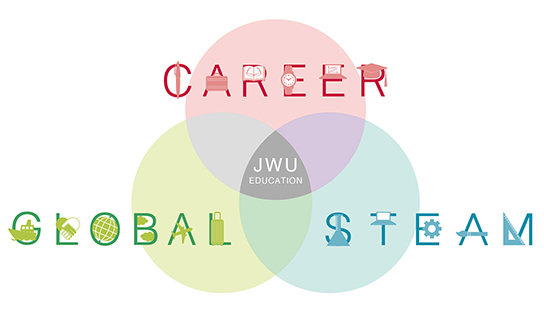- Diploma Policy (Master's Program)
- Curriculum Policy (Master's Program)
- Admission Policy (Master's Program)
- Diploma Policy (Doctoral Program)
- Curriculum Policy (Doctoral Program)
- Admission Policy (Doctoral Program)
Diploma Policy (Master's Program)
Knowledge and understanding
- Students have an understanding of human beings and society, and the relationship between the two, with expertise in education.
Thinking and judgment
- Students make appropriate judgments based on their academic and a professional perspective by examining various educational phenomena through literature-based research and multifaceted perspectives.
Interest, volition, attitude
- Students have the interest, volition, and attitude to analyze various issues related to education from a professional perspective.
Skills and expressions
- Students understand and utilize educational research methodologies.
Curriculum Policy (Master's Program)
Knowledge and understanding
- The curriculum is designed to balance theory and practice to help students develop their understanding and professional insights into educational phenomena in the home, school and society.
Thinking and judgment
- Specialized and interdisciplinary subjects are offered to foster researchers and practitioners with educational expertise.
Interest, volition, attitude
- Students' interest, motivation, and attitude toward educational research are enhanced by taking courses through the credit transfer system, taking a wide range of courses including courses from other majors and other universities, and through individualized thesis guidance.
Skills and expressions
- The curriculum is designed to provide students with literature-based, quantitative, and qualitative methodologies and interdisciplinary research to advance professional studies in education.
Admission Policy (Master's Program)
Knowledge and understanding
- Someone with the academic ability to understand educational research.
Thinking and judgment
- Someone who can think and judge independently based on the specialized knowledge they possess.
Interest, volition, attitude
- Someone who works on educational issues with the aim of forming advanced professional knowledge and wishes to become a researcher or practitioner involved with education.
Skills and expressions
- Someone with the expressive ability to properly describe their views, and the ability to think logically.
Diploma Policy (Doctoral Program)
Knowledge and understanding
- Possesses the ability to understand human beings, society and the relationship between both with a high level of expertise on pedagogy as well as a deep academic knowledge of pedagogy that is sufficient for acquiring a doctorate degree.
Thinking and judgment
- Possesses the ability to add multifaceted studies from the perspective of literature research in regard to various matters related to education, and the ability to carry out appropriate judgments regarding said matters with deep knowledge and a highly expert viewpoint.
Interest, volition, attitude
- Possesses the ability to have the interest, motivation, and attitude to analyze issues related to education from a highly specialized perspective.
Skills and expressions
- Possesses the ability to understand and apply the methodologies of education and research while taking the latest research into account.
Curriculum Policy (Doctoral Program)
Knowledge and understanding
- Organize a balanced curriculum of theory and practice to understand educational phenomena in the family, school, and society, and to deepen professional insights at a high level.
Thinking and judgment
- Specialized and interdisciplinary subjects are offered to foster researchers and practitioners with advanced educational expertise.
Interest, volition, attitude
- In order to enhance students' interest, motivation and attitude toward completing a high-quality doctoral thesis, the division allows students to take a wide range of subjects through the credit transfer system and audit subjects in other divisions and universities, as well as providing dissertation guidance mainly through individual guidance.
Skills and expressions
- Organize a curriculum that enables literature-based, quantitative, and qualitative methodologies for advancing excellent professional research in education, as well as interdisciplinary and international research.
Admission Policy (Doctoral Program)
Knowledge and understanding
- Students who possesses the academic ability to highly understand educational research.
Thinking and judgment
- A person who can think and make decisions independently and logically based on their specialized knowledge.
Interest, volition, attitude
- Students who wish to work on educational issues with the aim of building on the advanced professional knowledge and research capabilities necessary for highly-skilled professionals, and to become researchers and practitioners in education.
Skills and expressions
- Students who can express themselves and think logically, and who can appropriately state their views from a professional standpoint.

